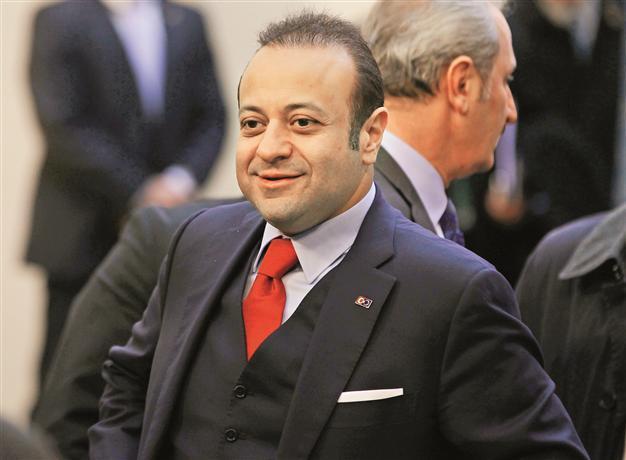Turkey seeks coaction with EU on PKK, says Minister Bağış
MURAT YETKİN ISTANBUL - Hürriyet Daily News

Egemen Bağış. AA Photo
The dialogue process the Turkish government initiated between the National Intelligence Agency (MİT) chief, Hakan Fidan, and the imprisoned leader of the outlawed Kurdistan Workers’ Party (PKK), Abdullah Öcalan, has begun to have positive repercussions both in the U.S. and the EU.Speaking to daily Milliyet, U.S. President Barack Obama said they hailed a “peaceful solution,” while the EU brought the subject to its agenda last week.
After Peace and Democracy Party (BDP) co-chair Selahattin Demirtaş said he was hopeful about the talks during a European Parliament meeting he attended Feb. 6, an increasing number of support messages came from the EU authorities. Along with the favoring statements of EU Presidency Minister Lucinda Creighton, EU Enlargement Commissioner Stefan Füle also said they wanted to contribute to the process.
Evaluating the statements, Turkey’s EU minister and chief negotiator, Egemen Bağış, said the signs from Brussels were also regarded positively in Ankara, causing them to expect “concrete cooperation.” Bağış answered questions of the Hürriyet Daily News as follows:
- “During a period in which harsh statements prevail with regards to EU-Turkey affairs, unexpected support came to the process of dialogue with the PKK. Some even interpreted it as “the paths to the EU pass through İmralı island,” referring to an old remark uttered by former Prime Minister Mesut Yılmaz for Diyarbakır. Do you agree with that?”
“So far, we have not heard such a statement from any EU authority, and we would not appreciate it if they said so. The position of chief negotiator is based in Ankara, not İmralı. The EU process can only progress through the Parliament’s General Assembly.
“We expect the media groups, which manipulate the statements of Europe and reflect them in a provocative way, to act more responsibly. We know some former politicians, who proposed certain cities as key locations for the progress of the EU process, and currently, headlines resembling these former remarks will not make any contribution to the EU and solution processes; they will only hinder them. To speak frankly, we cannot determine which side they are on as [long as] we see such attitudes.”
- “Füle said, ‘The successful completion of the peace process will accelerate Turkey’s full membership negotiations with the EU.’ How do you consider it?”
“Many EU authorities including Mr. Füle have issued positive statements on the disarmament process of the PKK. We attach importance to such comments; however, we also expect them to be turned into ‘concrete cooperation.’
“Of course, ending terrorism and silencing arms are crucial for a peaceful atmosphere in Turkey. When we achieve this atmosphere, we will also have the opportunity to acquire higher standards of democracy and liberties. And the EU process will naturally gain speed as a result of it.
“But I would like to remind our European fellows that the political obstacles we are exposed to have brought the most harm to the EU process. If these obstacles did not exist, Turkey’s EU process would be naturally accelerated, and covering these obstacles with the ongoing peace process would be an opportunist attitude.
“It would be right for the European countries to form concrete cooperation with Turkey and fight against terrorism in the ongoing process rather than showing concern about their reflections in the EU process.”
- “What kind of ‘concrete cooperation’ does Ankara expect from Brussels?”
“EUROPOL’s report was announced recently. According to that report, the PKK engaged in various criminal activities in EU countries that bring approximately 20 million euros of annual income. I believe that the real number is even higher than this, which is already alarming. After the recent attack against the U.S. Embassy in Ankara, the threat caused by terrorists, whose extradition from European countries has been demanded, has become evident. Also, consider the attack that was committed in the very center of Paris. We hoped these [incidents] taught a lesson.
“Another interesting piece of data in EUROPOL’s report is that 80,500,000 people between the ages of 15 and 64 in Europe are estimated to have tried or used marijuana. This number corresponds to 23.7 percent of this age range, and the number of people using marijuana is 18 million among people between the ages of 15 and 24, while 108,000 people are undergoing drug treatment. In 2011 514 tons of cannabis resin and 146 tons of cannabis plants were seized in Europe. Can we say these statistics bear no relation with the PKK? Now, the EU has to make a choice. It will either save the future of their youth by stopping this threat, or surrender to terrorism by tolerating the activities of the PKK.”
As can be seen, Bağış thinks the achievement of concrete cooperation depends on the EU’s cutting off of the income sources of the PKK. This indicates that during the EU process, Turkey will put emphasis on the Law to Prevent Financing of Terrorism, which passed in Parliament last week.
And even more importantly, Bağış also stated that the steps taken in the political resolution of the Kurdish issue would mobilize Turkey’s EU process. As Bağış said the paths to the EU passed through Parliament only, the BDP might be involved in the process more actively through the government’s initiative.











